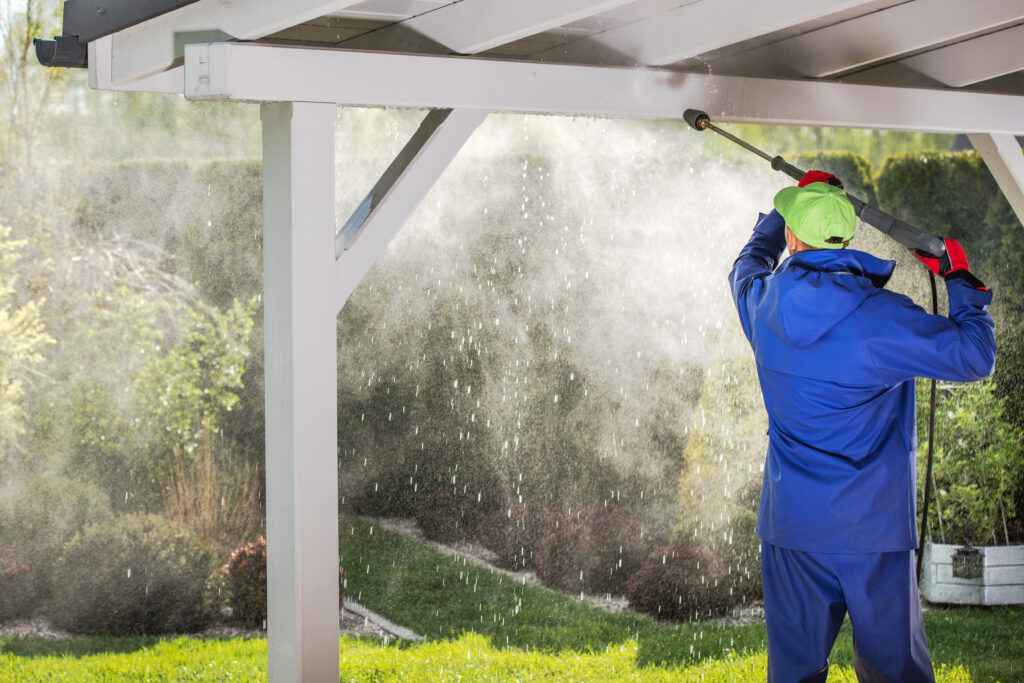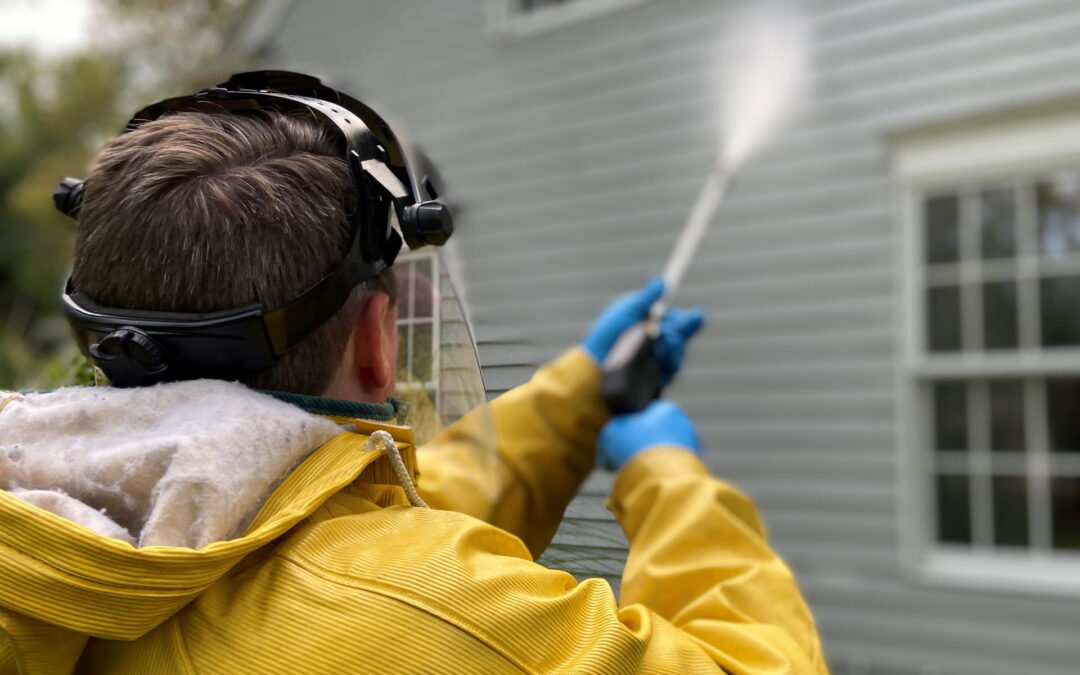Keeping a property’s exterior spotless demands the right cleaning approach, yet many homeowners and commercial building owners find themselves uncertain when deciding between a professional pressure washing service and soft washing. Each technique offers unique benefits, and using the incorrect method can lead to subpar cleaning results or even structural harm.
A professional pressure washing service harnesses a powerful water stream to strip away layers of grime, oil, and embedded stains, making it highly effective for solid surfaces. Soft washing, on the other hand, utilizes a gentle-pressure application combined with biodegradable cleaning agents to dissolve contaminants efficiently. Recognizing the appropriate method protects surfaces while ensuring deep and lasting cleanliness.
Distinctions Between Pressure Washing and Soft Washing
These two exterior cleaning techniques may seem interchangeable at first glance, yet they have substantial differences. A property manager once attempted to remove mold from a painted stucco surface using an industrial-grade pressure washer—only to discover that the excessive force stripped the paint. Switching to soft washing successfully eliminated the stains without damaging the stucco.
Both techniques contribute significantly to preserving a property’s curb appeal, though they serve different purposes:
- Pressure washing is optimal for durable, non-porous materials such as driveways, sidewalks, and expansive commercial facades.
- Soft washing is the preferred choice for fragile materials such as asphalt shingles, vinyl siding, and wooden decks.
Selecting the correct method extends the lifespan of exterior features while preventing costly damage.
How Pressure Washing Works on Hard Surfaces
Certified pressure washing professionals utilize high-powered water jets to eradicate dirt, mold, and deep-set stains from resilient surfaces. This approach proves especially effective in high-traffic zones where grime, grease, and mildew accumulate. With water pressure reaching up to 4,000 PSI, this technique is one of the most efficient solutions for maintaining commercial and residential properties.
Pressure washing is particularly advantageous for:
- Removing stubborn grease and oil stains from concrete driveways and parking lots.
- Stripping peeling paint or graffiti from brick and stone facades.
- Eradicating moss and mildew from patios, pavers, and exterior stairways.
The Environmental Protection Agency (EPA) warns that improper high-pressure washing can produce contaminated runoff, negatively impacting local water supplies. Professional pressure washing services follow strict containment protocols to prevent pollution and protect surrounding landscapes.
Advantages of Soft Washing for More Delicate Materials
Soft washing offers a safer alternative for materials that cannot withstand intense water pressure. Instead of forceful streams, this approach relies on eco-friendly detergents that break down algae, bacteria, and dirt at a molecular level. A controlled, low-pressure rinse then washes away contaminants without compromising delicate surfaces.
Soft washing proves highly effective for:
- Removing black streaks, lichen, and algae from roofs.
- Cleaning siding, shutters, and wooden fences without surface deterioration.
- Safely washing windows, solar panels, and ornamental fixtures without the risk of cracking or etching.
The Centers for Disease Control and Prevention (CDC) highlights that untreated mold and mildew can contribute to respiratory complications and structural decay. Routine soft washing helps mitigate these concerns while fostering a cleaner, healthier living space.
Choosing the Proper Cleaning Method for Each Surface
Using an inappropriate cleaning approach may result in unnecessary repairs. While pressure washing eliminates embedded grime through sheer force, soft washing neutralizes stains through chemical treatment before a delicate rinse.
A breakdown of these methods:
- Pressure washing is most effective for removing thick dirt deposits from sturdy surfaces.
- Soft washing targets organic growth, such as mildew and algae, with specialized cleaning compounds.
Applying the right technique enhances long-term cleanliness while preventing premature wear. Property owners who misapply these methods risk erosion, water intrusion, or ineffective cleaning. Professional exterior cleaning specialists evaluate surfaces thoroughly before determining the most suitable treatment.

Best Applications for Pressure Washing and Soft Washing
Several factors influence which cleaning method is ideal, including the type of material, level of contamination, and exposure to environmental conditions. Areas with heavy use often require pressure washing, whereas soft washing is best suited for painted and moisture-sensitive surfaces.
Common uses include:
- Pressure washing revitalizes driveways, sidewalks, and high-traffic concrete areas.
- Soft washing ensures safe cleaning for roofs, siding, and delicate wooden installations.
- A hybrid approach delivers a comprehensive clean for properties with varied surface materials.
Matching the correct technique to each surface prevents deterioration and enhances long-term structural integrity and appearance.
Why Professional Cleaning Services Provide Superior Results
Investing in professional pressure washing services guarantees a deep, thorough clean while eliminating risks associated with do-it-yourself attempts. Experienced technicians utilize industry-grade equipment and environmentally responsible cleaning solutions to remove stains without compromising structural integrity.
Key advantages of professional services include:
- Advanced tools that provide a more effective and enduring clean.
- Eco-friendly detergents that safeguard landscaping and minimize hazardous runoff.
- Adherence to safety guidelines and municipal regulations.
The Occupational Safety and Health Administration (OSHA) stresses that handling high-pressure cleaning equipment without proper training significantly increases the likelihood of accidents and property damage. A professional exterior cleaning service ensures safe and efficient operation, preventing injuries and protecting surfaces from deterioration.
Common Errors in DIY Exterior Cleaning
Many property owners attempt exterior cleaning projects without fully understanding the risks. Excessive water pressure on delicate surfaces can result in irreparable damage, while improper detergent choices may lead to staining or residual buildup.
Frequent mistakes include:
- Applying excessive pressure to wood or vinyl siding, causing cracks and warping.
- Using the wrong cleaning chemicals, leading to discoloration or material breakdown.
- Failing to rinse thoroughly, leaving streaks or soapy residue that attracts dirt more quickly.
Avoiding these missteps helps preserve exterior surfaces while reducing maintenance costs.
Key Takeaways on Pressure Washing and Soft Washing
Choosing the appropriate cleaning method is essential for maintaining a property’s exterior. Pressure washing offers an aggressive solution for durable materials, whereas soft washing gently removes organic buildup with minimal surface impact. Understanding which approach to use ensures long-lasting cleanliness and structural preservation.


